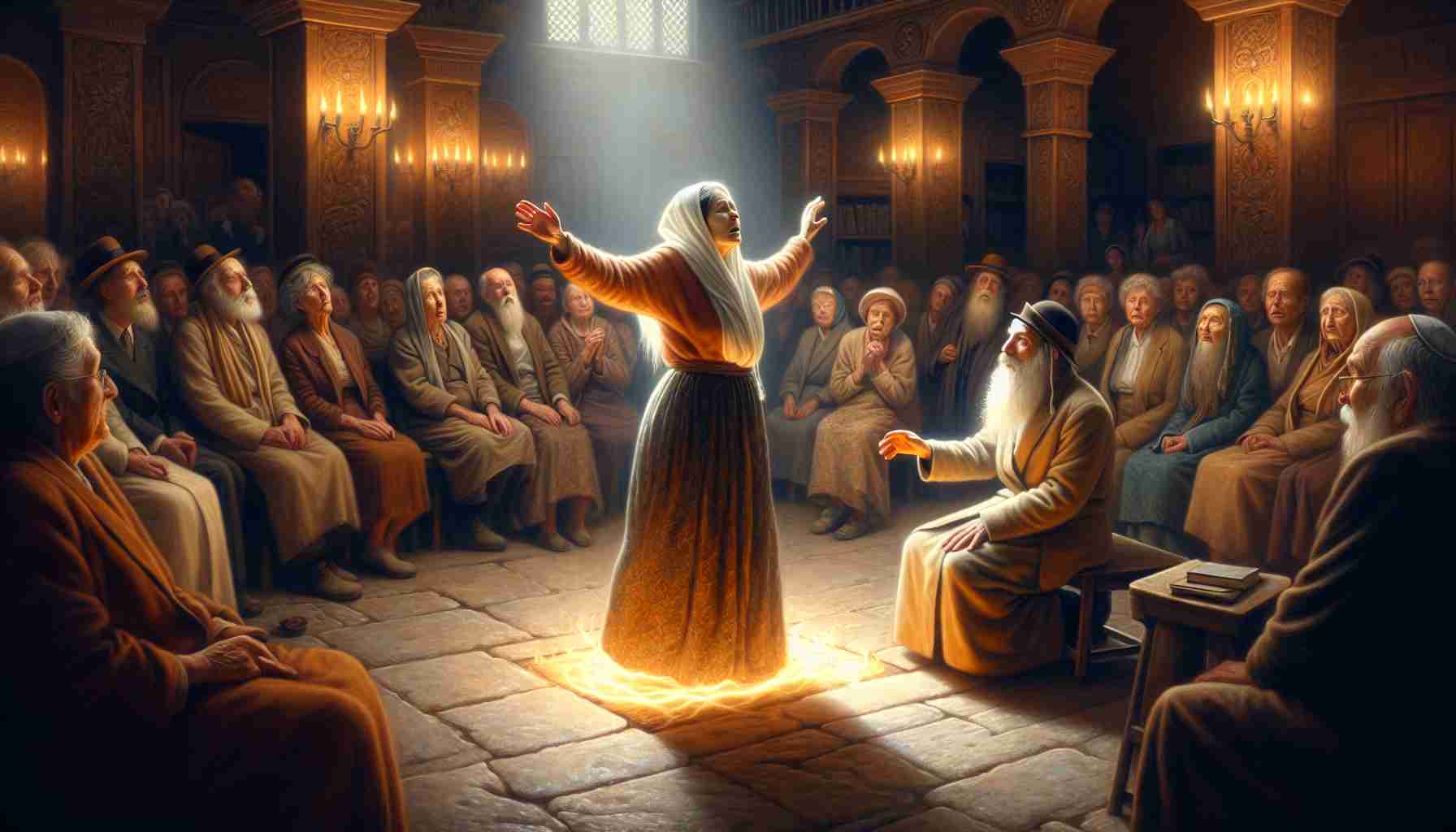

She moved quickly when the teacher spoke—though “quickly” was a habit her body hadn’t kept in years.
The crowd shifted around her, flowing forward inside the synagogue as the man from Nazareth rose to teach. Her fingers clutched the cloak over her shoulders, thin hands wrinkled and blue-knuckled from gripping canes for nearly two decades.
Eighteen years.
She didn’t count them anymore. Years blurred when the horizon never changed—when your eyes stayed fixed on dirt and sandals.
The synagogue smelled of old stone and unwashed robes, warm from breath and bodies. She shuffled past a fisherman’s wife and took her usual spot near the outer column where she could lean against the wall if needed.
“Woman,” the teacher’s voice called.
She froze.
“Come here.”
A hush fell over the crowd.
Her chin trembled. Not from fear but… something unfamiliar. Had he meant another? Or—
She stepped forward.
The space opened around her like an inhaled breath. She felt the weight of countless eyes pressing down on her, same as always, yet something broke through—urgency, soft and sharp. She hobbled further, back bent, shoulders curled under an invisible yoke.
When she reached him, she couldn’t lift her face.
She never could.
His feet were dusty. His robe simple. Both hands reached toward her.
She flinched. But only for a moment.
“Woman,” he said. “You are set free from your infirmity.”
He laid his hands on her shoulders.
The weight—it cracked.
A shiver raced down her spine—not fear, not pain, something deeper. Something powerful.
She startled upright.
The first thing she saw was light.
Then eyes—astonished, weeping, smiling. Faces she had never truly looked at. She blinked fast, overwhelmed.
Then her own hands, trembling in the air before her—no cane between them.
She stood. Straight.
She stood.
The joy hit as laughter, sudden and radiant.
Cries of praise burst from her lips—louder, freer than she’d ever spoken.
A gasp rippled through the congregation, followed by whispers, then swelling celebration.
But one man—stern, robes gathered tight around his pride—stepped forward.
“There are six days for work,” he barked, eyes cold. “Come to be healed on one of those, not the Sabbath.”
The joy stilled—not crushed, just quieted.
She glanced at Jesus.
He turned, calm, but kindled like a fire before dawn. “You hypocrites,” he said. “Don’t you untie your ox on the Sabbath and lead it to water? Should not this woman, a daughter of Abraham, whom Satan bound for eighteen years, be set free on the Sabbath day?”
Silence.
Then murmurs of shame. Others nodded, weeping now. The proud man stepped back into the crowd, eyes downcast.
But she didn’t watch him.
Her eyes stayed on Jesus.
He didn’t speak again.
He just smiled—as if he’d done something simple. As if lifting eighteen years from her shoulders had cost him nothing.
She wiped her face and laughed again, softly this time.
When she finally turned to leave, she walked slowly—but not because she needed to.
She moved quickly when the teacher spoke—though “quickly” was a habit her body hadn’t kept in years.
The crowd shifted around her, flowing forward inside the synagogue as the man from Nazareth rose to teach. Her fingers clutched the cloak over her shoulders, thin hands wrinkled and blue-knuckled from gripping canes for nearly two decades.
Eighteen years.
She didn’t count them anymore. Years blurred when the horizon never changed—when your eyes stayed fixed on dirt and sandals.
The synagogue smelled of old stone and unwashed robes, warm from breath and bodies. She shuffled past a fisherman’s wife and took her usual spot near the outer column where she could lean against the wall if needed.
“Woman,” the teacher’s voice called.
She froze.
“Come here.”
A hush fell over the crowd.
Her chin trembled. Not from fear but… something unfamiliar. Had he meant another? Or—
She stepped forward.
The space opened around her like an inhaled breath. She felt the weight of countless eyes pressing down on her, same as always, yet something broke through—urgency, soft and sharp. She hobbled further, back bent, shoulders curled under an invisible yoke.
When she reached him, she couldn’t lift her face.
She never could.
His feet were dusty. His robe simple. Both hands reached toward her.
She flinched. But only for a moment.
“Woman,” he said. “You are set free from your infirmity.”
He laid his hands on her shoulders.
The weight—it cracked.
A shiver raced down her spine—not fear, not pain, something deeper. Something powerful.
She startled upright.
The first thing she saw was light.
Then eyes—astonished, weeping, smiling. Faces she had never truly looked at. She blinked fast, overwhelmed.
Then her own hands, trembling in the air before her—no cane between them.
She stood. Straight.
She stood.
The joy hit as laughter, sudden and radiant.
Cries of praise burst from her lips—louder, freer than she’d ever spoken.
A gasp rippled through the congregation, followed by whispers, then swelling celebration.
But one man—stern, robes gathered tight around his pride—stepped forward.
“There are six days for work,” he barked, eyes cold. “Come to be healed on one of those, not the Sabbath.”
The joy stilled—not crushed, just quieted.
She glanced at Jesus.
He turned, calm, but kindled like a fire before dawn. “You hypocrites,” he said. “Don’t you untie your ox on the Sabbath and lead it to water? Should not this woman, a daughter of Abraham, whom Satan bound for eighteen years, be set free on the Sabbath day?”
Silence.
Then murmurs of shame. Others nodded, weeping now. The proud man stepped back into the crowd, eyes downcast.
But she didn’t watch him.
Her eyes stayed on Jesus.
He didn’t speak again.
He just smiled—as if he’d done something simple. As if lifting eighteen years from her shoulders had cost him nothing.
She wiped her face and laughed again, softly this time.
When she finally turned to leave, she walked slowly—but not because she needed to.